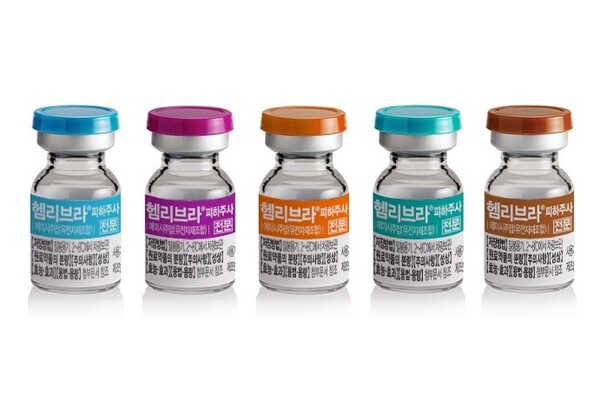JW Pharmaceutical said Monday the first study to demonstrate the efficacy and safety of Hemlibra (emicizumab) for Korean pediatric patients with severe non-inhibitor hemophilia A was featured in the journal Blood Research.
While international studies have already shown Hemlibra’s effectiveness in reducing bleeding episodes in pediatric patients, a JW Pharmaceutical representative noted the study’s significance as the “first to confirm Hemlibra’s efficacy and safety using actual prescription data for pediatric patients in Korea.”

Hemlibra is a treatment designed to mimic the activity of clotting factor VIII (antihemophilic factor), which is deficient in hemophilia A patients. The drug utilizes bispecific antibody technology, allowing it to bind to clotting factors IX (Christmas factor) and X (Stuart-Prower factor) simultaneously. Hemlibra is the only treatment for hemophilia A available for both inhibitor and non-inhibitor patients, unlike conventional factor VIII therapies, and offers sustained prophylactic effects through a once-monthly subcutaneous injection.
The study, led by Professor Kim Sung-eun from the department of pediatrics at Kyungpook National University Hospital, followed 21 pediatric patients aged 0-11 with severe non-inhibitor hemophilia A, from June 2020 through March 2024. Patients received Hemlibra for over six months, with researchers tracking their annual bleed rate (ABR) and annual joint bleed rate (AJBR).
Results showed a significant decrease in ABR, from 7.04 episodes to 0.41 episodes after Hemlibra treatment, while AJBR dropped from 2.28 episodes to 0.21 episodes. 18 of the 21 patients experienced no bleeding episodes within six months of starting treatment.
In terms of safety, no serious or life-threatening side effects, such as thromboembolism or systemic hypersensitivity reactions, were observed.
The full study detailing these findings was published in the Korean journal Blood Research.
Related articles
- JW Shinyak joins in global P4 trial for hair care cosmetics
- JW Pharmaceutical’s Q2 revenue fell 7% on year to ₩170.7 bil.
- JW Pharm acquires rights for Kissei Pharmaceutical's uterine fibroid treatment
- JW Pharmaceutical and Oncocross to co-develop new drugs using AI
- JW Pharmaceutical shows superiority of 'JW0061' in hair growth over existing treatments in US
- JW Pharmaceutical to unveil preclinical results of ‘JW0061’ for hair loss in US
- JW Pharmaceutical partners with US-based Tempus AI to advance anti-cancer drug development
- JW Pharmaceutical marks industry-leading profit margin in Q3 on specialty drug sales growth
- JW Pharmaceutical launches combination drug for GERD
- Hemophilia patients are encouraged to do aerobic exercise, strengthen muscle
- New test enables patients using Hemlibra to assess their hemophilia severity
- Hemlibra proves effective in improving hemophilia A patients’ joint pain
- 'Separate treatment protocols needed for acquired and congenital hemophilia A'

